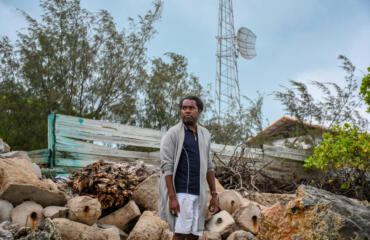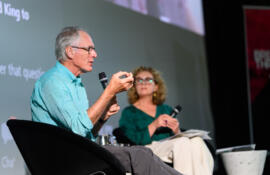
Retired policeman and community leader Ed Tyrie: “You grab a cat by the tail and it still hasn’t stopped jumping around.” PIC: Cameron Clarke

Stanley, a verdant little community about 300 kilometres northeast of Melbourne, is a picturesque paradise for both farmers and tree-changers – a collection of apple, walnut and chestnut orchards tucked away within Victoria’s High Country.
A winding road from Beechworth opens up to a quaint pub and makeshift post office, and a town centre so quiet that the crunch of gravel underfoot sounds disrespectfully loud.
But the serenity is deceptive; Stanley is fired up. Large wooden signposts scattered around town hint at the reason. “Stanley Water for Stanley,” they read in bold white text.
Only about 700 people live in this tiny mountain idyll, but they are grappling with an issue that confronts communities across Australia. An ongoing dispute with a water bottling company begs the question: how should we manage and protect the country’s most precious and fickle resource – water?
“I know more about water than I’ve ever known in my life,” says a determined Ed Tyrie, a retired federal policeman-turned-meditation teacher, who chairs the local community association and is a driving force behind the Stanley Water for Stanley campaign.

“It drives me to distraction. It really does, because it’s one of those things that you grab hold of. You grab a cat by the tail and it still hasn’t stopped jumping around.”
Mr Tyrie and his neighbours are united in their opposition to Tim Carey, the owner of a water supply company, who wants to mine the local ground water for bottling. The water could be sold interstate or overseas – to Japan, maybe – marketed as pure spring water, or used simply to fill swimming pools.
The dispute erupted in 2013, after Mr Carey, whose family owns the Ballarat-based Black Mount Spring Water, bought a 16-hectare mixed-use farm and orchard in Stanley under the name of Stanley Pastoral. Mr Carey successfully petitioned the local water authority for the right to build a bore on his property and use it to extract 19 million litres of water each year.

Groundwater mined from Stanley would be trucked off to Albury and sold to a water bottling company owned by the Japanese beverage giant Asahi.
But Stanley Pastoral has met with fierce opposition from residents who see Mr Carey’s proposal as a threat to their way of life – the quality of their roads, the availability of their water and the future viability of their land.
Geoffrey Fryer, who lives nearby on a four-hectare property, says Stanley Pastoral’s plan could have unforeseen consequences for a community that’s heavily dependent on water for irrigation.
“Nobody can tell me what impact, if any, Mr Carey pulling 19 megalitres of water out of the ground would have on my bore, or if it will end up with no water at all,” he says. “There’s no way of predicting that unless it runs out.”
Mr Fryer says Stanley water is special; it is pristine and it should stay here. The town is renowned for the quality of its cherries, walnuts and chestnuts, all water-intensive crops.
“This is prime agricultural land up here,” Mr Fryer adds. “Anybody who draws water from the ground up here, they use it directly on their crops – fruits, nuts, berries and so on.
“That’s what the water is really here for. That’s what the Stanley Water for Stanley campaign is really saying. Sure, pull your water out of the ground, but at least use it here to grow something. Don’t just truck it off and make a killing out of it.”
The water regulator, Goulburn-Murray Water, has already granted Stanley Pastoral the right to mine groundwater from its 60-metre-deep bore. But the company still needs planning permission to build the infrastructure needed to store and transfer water, including a shed for stainless steel tanks and a docking facility for trucks.
“That’s what the Stanley Water for Stanley campaign is really saying. Sure, pull your water out of the ground, but at least use it here to grow something. Don’t just truck it off and make a killing out of it.” — Stanley resident Geoffrey Fryer
Last month, about 30 community members crammed into the Beechworth chambers of Indigo Shire Council, where they applauded the council’s unanimous decision to reject Stanley Pastoral’s application. The council said the proposal could damage the continued productivity of an area recognised for its high quality agricultural land, claiming it could reduce stream flows, threaten the availability of groundwater and increase traffic on local roads.
Stanley Pastoral had resubmitted its application to council after the Victorian Civil and Administrative Tribunal ruled in January that the company needed to include an Aboriginal cultural heritage management plan.
This came after Mr Carey went to VCAT with the complaint that the council had not made a decision on his proposal within the required time frame.
Locals have had little contact with Mr Carey, except at a Stanley community forum in February last year when the Ballarat businessman reportedly said he would use his newly-acquired site as a “backup” resource.
“I have been through this process before and understand your concerns,” he said at the time. “I won’t convince everyone, but am supplying information.”
“We do want to be good neighbours as much as we can,” he added.
Many Stanleyites, however, say Mr Carey has done little to endear himself to the community. In their minds, he has morphed from a former Ballarat potato farmer into a rarely-sighted public enemy.

Mr Carey declined to discuss the council’s most recent decision, which he is taking back to VCAT on appeal, but has made clear in the past that he intends pursuing his proposal to the finish line.
His opponents seem equally determined. At the May 26 council meeting, Indigo Shire Mayor Bernard Gaffney told councilors that the “war is far from over”.
Resident Mr Tyrie says the council’s decision “justified the hard work of the community”, and pledges to keep campaigning.
Mayor Gaffney says that “99.9 per cent” of the community is against Stanley Pastoral’s plan. He says the council received 200 submissions from residents when it first considered the permit.
“I’ve never seen the like of it before,” he says. “All council has done is really to advocate on behalf of its community of which we’re duty bound to do.”
Mr Carey’s property is on Cue Springs Road, a narrow back-road bordered by eucalypts that narrows to room for one car. His neighbours run an organic vegetable farm.
He plans to transport the water in 19-metre-long, B-double water tankers, from Cue Springs Road through Stanley and Beechworth to Albury. Many local objections to his proposal relate to the safety and upkeep of the area’s winding country roads and the impact the tankers will have on traffic, particularly in a popular cycling and tourism area.

“I don’t want to be down there with some poor cyclist who’s been thrown under 18 wheels of truck and have to be the first responder,” Mr Fryer says, grimly. “None of our people should have to deal with that sort of thing. And it will happen. It’s not a freeway, for goodness sake. It’s just a little country road.”
Stanley Pastoral argues in its application that it will limit the tankers to an average of 1.5 loads per working day between 7am and 7pm. The permit also argues that the property will continue to use the land for cattle grazing and horticulture.
It says that the sale of water will “assist with sustainable land management practices by providing extra farm income to help make the overall farm viable.”
But some locals have accused the company of failing to maintain the land as promised, claiming that this could pose a biosecurity risk to other growers. They say that untended orchards could attract unwanted pests and diseases that could spread to neighbouring farms. Mr Carey has denied this.
“I have been through this process before and understand your concerns . . . We do want to be good neighbours as much as we can.” — water bottler Tim Carey, reportedly to a community meeting
Stanley landowners get their water in a range of ways: from the ground, from surface water such as creeks and streams, or both. Stanley Pastoral’s Cue Springs Road property came with a 50 megalitre surface water allocation, but Mr Carey successfully applied for permission to swap 19 megalitres of that allocation for ground water.
Dave McIntyre, a local chestnut orchardist involved with the campaign, says Mr Carey’s water licence will effectively make him the biggest water user in Stanley.
“The reality is that the orchards in Stanley, because of its altitude and the nature of the crops, never use their full entitlements. Even on a dry year they’re only using 20 per cent,” Mr McIntyre says.
He calculates that the 19 million litres of water that would leave Stanley in Mr Carey’s trucks could be used to grow 18,000 chestnut trees.
He also claims that Goulburn-Murray Water carried out only a cursory review of water availability in the area that failed to account for the Stanley plateau’s unique properties.

However, Goulburn-Murray Water said in a statement that the licence it has granted Stanley Pastoral is “consistent” with the objectives of the area’s water supply protection plan. The authority said it does not charge licensees based on what they plan to do with the water.
Residents say Stanley is special. It has fertile soil and unusually fresh, untainted ground and surface water, while Indigo Shire recognises Stanley’s unique properties in its planning scheme, which protects the town from developments that it deems agriculturally unproductive.
Mr Tyrie acknowledges that 19 megalitres is a relatively small amount of water – a “teaspoon in an ocean”, he says – but the worry for the community is that Stanley Pastoral could inspire other would-be water miners.
“If you let them take this water, then you create the precedent to take more water off the Stanley plateau,” Mr Tyrie says. “If you take more water off the Stanley plateau, then that’s water that we can’t use.”
Also underlying the dispute is a latent moral aversion of many locals to the sale of bottled water from the driest inhabited continent on earth.
Mr Fryer says most Stanley residents object to what he calls the “myth” of bottled water, “the idea that somehow the water you get out of your tap is inferior to the water that comes out of the ground.”
Mr Tyrie says he prefers to stay out of the debate about the sale and export of bottled water.
“I’m not an environmentalist,” he says. But he adds that he was shocked to learn that a litre of bottled water can often be more expensive than a litre of petrol.
“The mind blows when you think you can go to a tap, turn it on and drink it for free.”
► An edited version of this story was also published in The Age.



